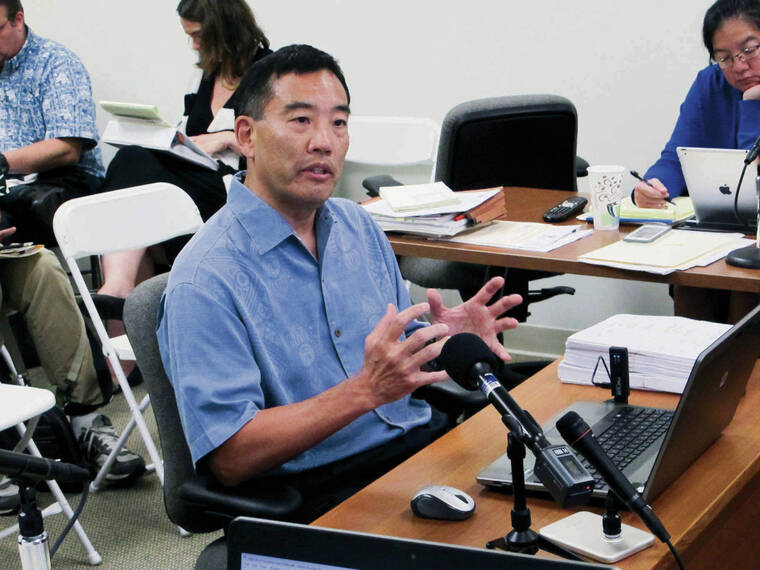There have been two distinct lines of inquiry during a state House investigation of separate audits of mismanaged land practices by two state agencies: one on the findings of the critical state audits, and the other focusing on how the audits themselves were conducted.
As the hearings enter their fourth week, resuming today for sessions slated to continue for about three more weeks, there has been no clear testimony presented — in public, at least — of obvious wrongdoing by state Auditor Les Kondo or his office.
At the same time, nearly all of the questions from a majority of the eight members of the special House Investigative Committee have focused on learning more about histories of poor practices and planning tied to the Agribusiness Development Corp. and the Department of Land and Natural Resources’ Special Land and Development Fund — and what reforms, if any, need to be addressed through law during the upcoming legislative session.
Among both House and Senate members, there are various theories about what’s driving the unusual “Chapter 21” investigative hearing that has seen witnesses subpoenaed, sworn in under oath and advised that they have the right to legal counsel, unlike typical legislative hearings. However, no lawmaker who has spoken to the Honolulu Star-Advertiser about the audit investigation was
willing to attach their name to any theory.
State Rep. Amy Perruso (D, Wahiawa-Whitmore-Puamoho), a member of the committee, remains especially focused on how the ADC’s land management on Kauai could relate to her constituents in regard to ADC-controlled land around Whitmore Village. That land is the site of ongoing criminal activity and a fire last week that will require the involvement of the federal Environmental Protection Agency, she said.
Perruso, who has unsuccessfully pushed for
restructuring the ADC though legislation, was pleased that its funding became linked through legislation to the agency’s participation in Kondo’s
audit that was released this year.
The Legislature created the ADC in 1994 to usher in more diversified agriculture following departure of sugar and pineapple staples. The state gave it unique exemptions and flexibility. Among other things, it can acquire, own and sell land, and lease or sell its lands to agricultural enterprises and farmers without having to go through a public auction process.
The hearings so far have covered a wide range of questions about the audits, including sometimes tense and combative exchanges between Kondo and Della Au Belatti, House majority leader and committee chairwoman, over the scope of the hearings, Belatti’s intentions and what Kondo has called her inappropriate
attempts to get his office’s “work papers.”
Perruso said the hearings “have felt uncomfortable at times.” She added, “I don’t think anybody escapes scrutiny,” including legislators.
“I think we’re going to end up taking a critical look at the role of lawmakers in this process,” she said. “I think that Mr. Kondo’s discomfort is unfortunate. But we have to ask questions, and some committee members have questions that I don’t have.
“I think the auditor is a team player and really intends to do the work and do it well,” Perruso said. “I don’t question his intentions. … But I agree with the chair of the committee to make sure that everything is in line with the audits. We wouldn’t be doing our job if we just accepted them on their face.”
Asked whether she’s found any wrongdoing by Kondo or his office either through public testimony or in thousands of audit-related documents that have been subpoenaed, with more to come, Perruso said, “I think the questions were legitimate. I think we’re still trying to figure out how the answers square with the documentary evidence.”
Asked how much pressure, if any, there is on the committee to find something inappropriate in Kondo’s
office, Perruso said, “I think there’s zero pressure. I don’t feel any pressure to produce a report that is critical of the auditor. Della is a very straightforward and direct person. If she has questions, she will ask. I don’t think that the outcome is predetermined at all.”
Committee member Val Okimoto (R, Mililani-Mililani Mauka-Waipio Acres) said in a statement to the Star-Advertiser, “My office is monitoring any curiosities that arise during the hearing process and we look forward to speaking on the committee’s full body of work at a later date.”
Rep. David Tarnas (D, Kaupulehu-Waimea-Halaula) — a member of the committee, chairman of the House Water and Land Committee and a professional coastal and marine fisheries planner — is particularly interested in the audit’s 2019 findings of DLNR’s Special Land and Development Fund, especially about DLNR’s planning.
Tarnas expects the next legislative session to result in changes to the way the program is managed, which likely would go through his committee. And Tarnas is prepared for the possibility that he might draft legislation himself, depending on what the House Investigative Committee finds in its report scheduled for publication in November.
Although the committee hearings have just crossed their midway point and no reform legislation has yet to be drafted, Tarnas said, “The investigation is bringing more public attention to a set of issues, and that’s healthy.”




